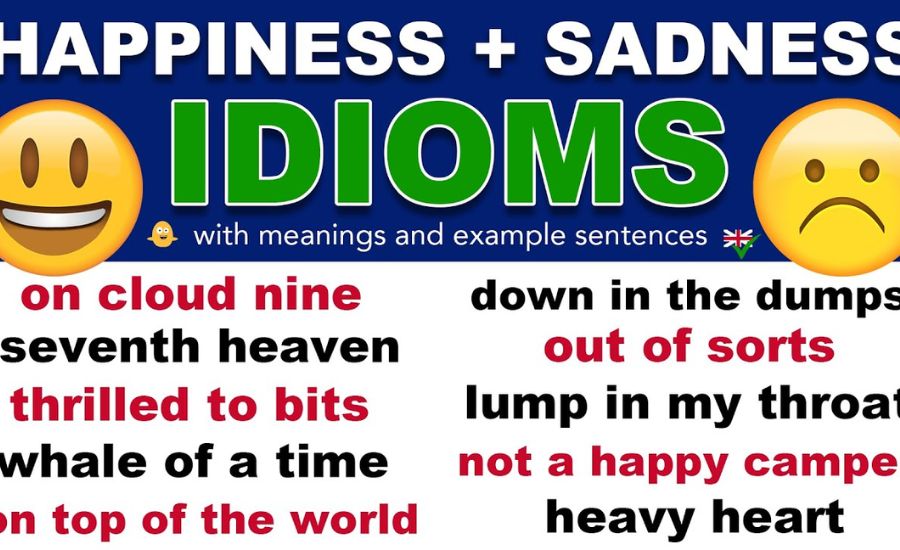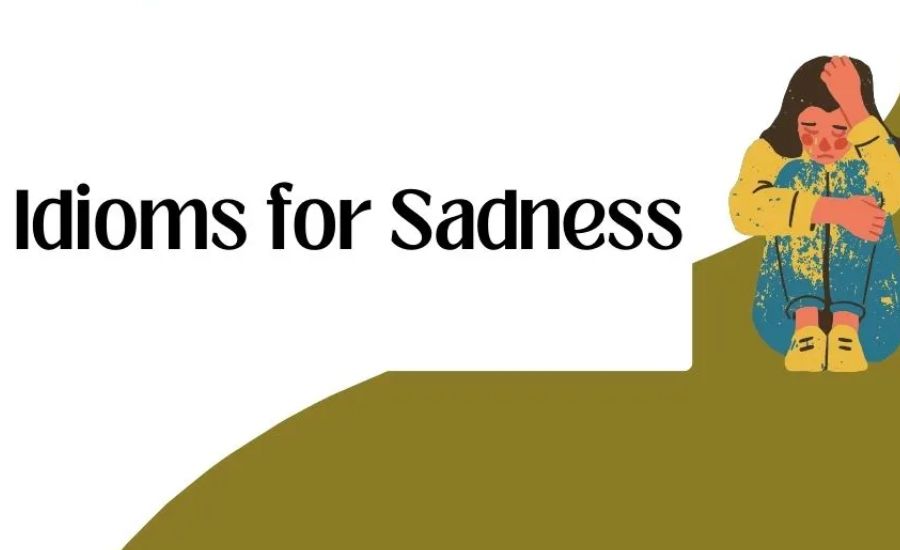Sadness is a universal emotion that everyone experiences at some point. Idioms for sadness help express these feelings in vivid, relatable ways.
Using idioms can add color and depth to how we talk about sorrow, melancholy, and heartache. Here are 30 idioms to enrich your vocabulary on sadness.
1. Down in the dumps
Meaning: Feeling very sad or depressed.
In a Sentence: She’s been down in the dumps since her pet passed away.
Other Ways to Say: Feeling blue, in low spirits, downhearted
2. Heavy heart
Meaning: Feeling deeply sad or troubled.
In a Sentence: With a heavy heart, he said goodbye to his childhood home.
Other Ways to Say: Broken-hearted, heartbroken, sorrowful
3. Cry over spilled milk
Meaning: To be upset about something that cannot be changed.
In a Sentence: Don’t cry over spilled milk; just focus on fixing the problem.
Other Ways to Say: Wallow in regret, lament in vain
4. Downcast eyes
Meaning: Looking sad or ashamed.
In a Sentence: Her downcast eyes showed how disappointed she felt.
Other Ways to Say: Cast down, drooping gaze, forlorn look
5. Tearjerker
Meaning: Something that causes people to cry or feel very emotional.
In a Sentence: That movie was such a tearjerker, I couldn’t stop crying.
Other Ways to Say: Heart-wrenching, moving, poignant

6. Broken heart
Meaning: Extreme emotional pain caused by loss or disappointment.
In a Sentence: He had a broken heart after the breakup.
Other Ways to Say: Heartache, shattered feelings, crushed spirit
See Also 30 Idioms About Beauty
7. In the doldrums
Meaning: Feeling sad, bored, or without energy.
In a Sentence: She’s been in the doldrums since her promotion was denied.
Other Ways to Say: Feeling low, in a slump, down and out
8. Blue mood
Meaning: A temporary state of sadness or gloom.
In a Sentence: He woke up in a blue mood this morning.
Other Ways to Say: Feeling down, melancholic, gloomy
9. Heavy-hearted
Meaning: Feeling weighed down by sadness.
In a Sentence: The heavy-hearted parents waited anxiously for news.
Other Ways to Say: Sad, burdened, grief-stricken
10. To wear one’s heart on one’s sleeve
Meaning: To openly show emotions, especially sadness.
In a Sentence: She wears her heart on her sleeve and never hides her feelings.
Other Ways to Say: Be open-hearted, show feelings, emotionally transparent
11. Feeling blue

Meaning: To feel sad or depressed.
In a Sentence: He’s been feeling blue ever since his friend moved away.
Other Ways to Say: Down in the dumps, melancholy, low-spirited
12. Down and out
Meaning: Experiencing sadness often coupled with hardship.
In a Sentence: After losing his job, he felt down and out.
Other Ways to Say: Depressed, beaten down, out of luck
13. Cry one’s eyes out
Meaning: To cry very intensely.
In a Sentence: She cried her eyes out after watching that heartbreaking film.
Other Ways to Say: Sob uncontrollably, weep bitterly, bawl
14. The blues
Meaning: A state of sadness or depression.
In a Sentence: He’s had the blues ever since the team lost the finals.
Other Ways to Say: Feeling down, gloom, sadness
15. Heart sinks
Meaning: To suddenly feel disappointed or sad.
In a Sentence: Her heart sank when she saw the bad news.
Other Ways to Say: Feel crushed, lose hope, feel deflated
16. Face like a wet weekend
Meaning: Looking very unhappy or miserable.
In a Sentence: After hearing the bad news, he had a face like a wet weekend.
Other Ways to Say: Miserable look, sad expression, downcast face
17. To have the weight of the world on one’s shoulders
Meaning: Feeling overwhelmed by worries or sadness.
In a Sentence: She carries the weight of the world on her shoulders with all her responsibilities.
Other Ways to Say: Burdened, stressed, emotionally heavy
18. Wear a long face
Meaning: To look sad or disappointed.
In a Sentence: Don’t wear a long face; things will get better.
Other Ways to Say: Look down, sad look, gloomy expression
19. Break down in tears
Meaning: To suddenly start crying.
In a Sentence: She broke down in tears when she heard the news.
Other Ways to Say: Burst into tears, sob, cry suddenly
20. A heavy cloud hanging over
Meaning: A feeling of sadness or worry that affects the mood.
In a Sentence: There was a heavy cloud hanging over the family after the accident.
Other Ways to Say: Gloomy atmosphere, dark mood, oppressive feeling
21. To feel low
Meaning: To feel sad or depressed.
In a Sentence: I’ve been feeling low since my friend moved away.
Other Ways to Say: Feeling down, melancholy, downhearted
22. Downhearted
Meaning: Feeling discouraged or sad.
In a Sentence: She was downhearted after failing the test.
Other Ways to Say: Disheartened, gloomy, sad
23. Cry the blues
Meaning: To express sadness or complaint loudly.
In a Sentence: He’s always crying the blues about his job.
Other Ways to Say: Moan, complain, lament
24. In a funk
Meaning: In a bad mood or feeling sad.
In a Sentence: He’s been in a funk since his dog went missing.
Other Ways to Say: Feeling down, moody, depressed
25. To be at one’s lowest ebb
Meaning: To be feeling very sad or discouraged.
In a Sentence: After the breakup, she was at her lowest ebb.
Other Ways to Say: At rock bottom, in despair, feeling hopeless
26. To drown one’s sorrows
Meaning: To try to forget sadness by drinking alcohol.
In a Sentence: After the loss, he went to the bar to drown his sorrows.
Other Ways to Say: Drink away pain, numb the pain, self-medicate
27. To have a face like thunder
Meaning: To look very angry or upset.
In a Sentence: He had a face like thunder when he heard the bad news.
Other Ways to Say: Look furious, livid, upset
28. To be in tears
Meaning: To be crying.
In a Sentence: She was in tears after hearing the sad story.
Other Ways to Say: Crying, weeping, sobbing
29. To be glum
Meaning: To be silently unhappy or gloomy.
In a Sentence: He looked glum after the team lost the match.
Other Ways to Say: Morose, downcast, gloomy
30. To feel heartbroken
Meaning: To feel very sad, especially after a loss or disappointment.
In a Sentence: She was heartbroken when her best friend moved away.
Other Ways to Say: Devastated, shattered, deeply sad
Idioms for Sadness: MCQs Quiz
1. What does the idiom “Down in the dumps” mean?
A) Feeling very happy
B) Feeling very sad or depressed
C) Feeling excited
D) Feeling confused
Answer: B) Feeling very sad or depressed
2. Which idiom means to be upset about something that cannot be changed?
A) Cry over spilled milk
B) Wear a long face
C) Heavy heart
D) Tearjerker
Answer: A) Cry over spilled milk
3. If someone “wears their heart on their sleeve,” what are they doing?
A) Hiding their feelings
B) Openly showing their emotions
C) Feeling sad quietly
D) Avoiding emotions
Answer: B) Openly showing their emotions
4. What does the idiom “Break down in tears” describe?
A) To laugh uncontrollably
B) To suddenly start crying
C) To feel sad but not cry
D) To ignore sadness
Answer: B) To suddenly start crying
5. Which idiom means feeling weighed down by sadness?
A) Heavy-hearted
B) Face like thunder
C) To drown one’s sorrows
D) In a funk
Answer: A) Heavy-hearted
6. “A heavy cloud hanging over” refers to:
A) A sunny, cheerful day
B) A feeling of sadness or worry affecting the mood
C) A sudden burst of happiness
D) Feeling indifferent
Answer: B) A feeling of sadness or worry affecting the mood
7. What is the meaning of “To drown one’s sorrows”?
A) To forget sadness by drinking alcohol
B) To swim to forget problems
C) To express happiness loudly
D) To cry silently
Answer: A) To forget sadness by drinking alcohol
8. If someone has a “face like a wet weekend,” how do they look?
A) Very happy
B) Very miserable or unhappy
C) Angry
D) Confused
Answer: B) Very miserable or unhappy
9. The idiom “Feeling blue” means:
A) Feeling sad or depressed
B) Feeling angry
C) Feeling excited
D) Feeling confused
Answer: A) Feeling sad or depressed
10. Which idiom describes crying very intensely?
A) Cry one’s eyes out
B) Wear a long face
C) Heavy heart
D) Down in the dumps
Answer: A) Cry one’s eyes out
Conclusion
Sadness can be expressed in many ways, and idioms provide a colorful, relatable language to describe these emotions. Using idioms like these helps convey feelings more vividly in everyday conversations.
Whether it’s heartbreak, disappointment, or melancholy, these expressions enrich our ability to communicate sorrow. Understanding and using them can make our language more expressive and empathetic. Keep exploring idioms to better connect with the feelings of yourself and others.
Read More About Idioms At spotwave

